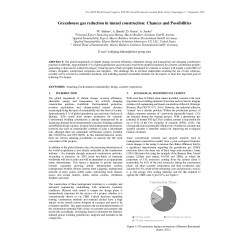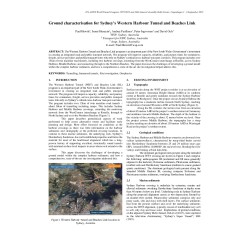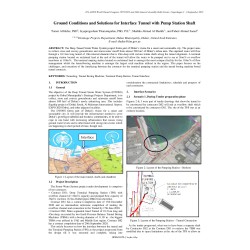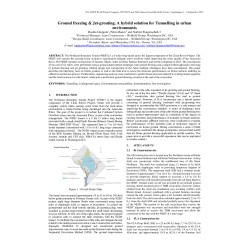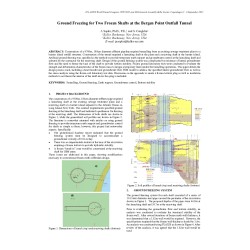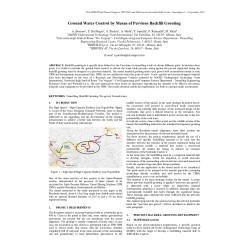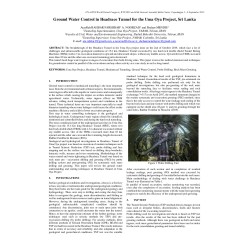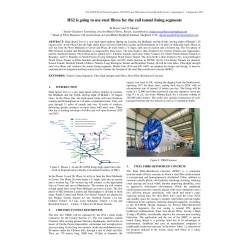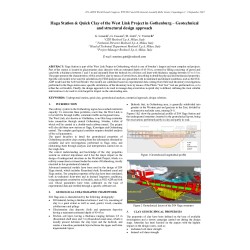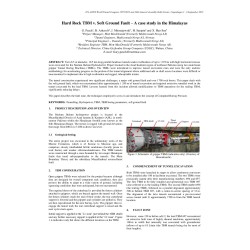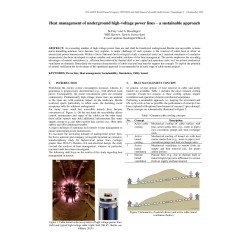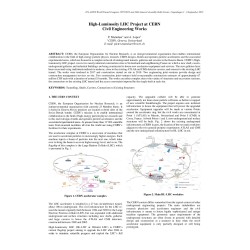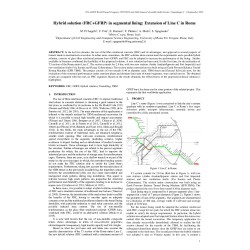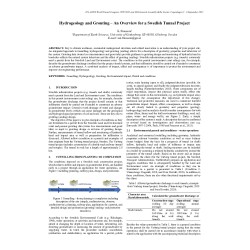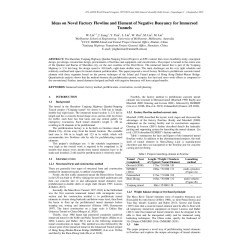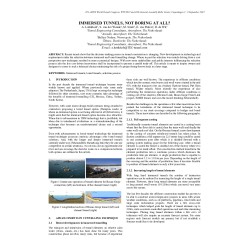No document
Search & filter
Search for a publication
Search & filter
World Tunnelling Congress
WTCThere are 1984 documents.
-
Greenhouse gas reduction in tunnel construction Chances and Possibilities
Abstract: The global megatrends of climate change, resource efficiency, alternative energy and transparency are changing construction practices worldwide. Approximately 8 % of global greenhouse gas emissions result from cement production for concrete construction projects generating a clear need to reduce this impact. Tunnel projects which are highly dominated by concrete or cement, will require a joint...
0,00 € -
Ground characterisation for Sydney’s Western Harbour Tunnel and Beaches Link
Abstract: The Western Harbour Tunnel and Beaches Link program is an important part of the New South Wales Government’s investment in creating an integrated road and public transport network. The program will improve capacity, reliability, and journey times for commuters, freight, service providers and public transport users who rely on Sydney’s critical cross-harbour transport corridors. The program...
0,00 € -
Ground Conditions and Solutions for Interface Tunnel with Pump Station Shaft
Abstract: The Deep Tunnel Storm Water System project forms part of Dubai’s vision for a smart and sustainable city. The project aims to collect, store and convey groundwater and storm-water runoff from almost 500 km2 of Dubai’s urban area. The captured water will flow through a 10.3 km long tunnel of 10m internal diameter that is 45m deep with various intake shafts along the tunnel alignment. A terminal...
0,00 € -
Ground freezing and Jet -grouting. A hybrid solution for Tunnelling in urban
Abstract: The Northeast Boundary Tunnel (NEBT) is a 5 miles long tunnel and is the largest component of the Clean Rivers Project. The NEBT will connect the existing sewer system to significantly mitigate sewer overflow while improving the water quality of the Anacostia River. The NEBT includes construction of Tunnels, Shafts, Adits and Near Surface Structures and will be completed in 2023. The...
0,00 € -
Ground Freezing for Two Frozen Shafts at the Bergen Point Outfall Tunnel
Abstract: Construction of a 9700m, 180cm diameter effluent pipeline required tunnelling from an existing sewage treatment plant to a barrier island outfall structure. Construction of the tunnel required a launching shaft at the plant and a receiving shaft at the barrier island. Artificial ground freezing was specified as the method to provide temporary earth support and groundwater control at the...
0,00 € -
Ground Water Control by Means of Pervious Backfill Grouting
Abstract: Backfill grouting is a specific item defined by the Customers in tunnelling works to obtain different goals. In between these goals, it is worth to consider the ground water control: to release the water table pressure acting against the precast segmental lining, the backfill grouting must be designed as a pervious material. The actual standard grouting mixes (pea gravel with cementitious...
0,00 € -
Ground Water Control in Headrace Tunnel for the Uma Oya Project, Sri Lanka
Abstract: The breakthrough of the Headrace Tunnel in the Uma Oya project done on the 2nd of October 2019, which face a lot of challenges and unforeseeable geological conditions of 15.4 km. Headrace Tunnel excavated by two hard rock double shield Tunnel Boring Machines (TBMs) with 4.3 m excavation diameter in upward and downward slopes, without any middle access. Upward driven TBM excavated more than 10...
0,00 € -
HS2 is going to use steel fibres for the rail tunnel lining segments
Abstract: High Speed Two is a new high-speed railway linking up London, the Midlands and the North, serving eight of Britain’s 10 largest cities. In the Phase One, the high-speed trains will travel between London and Birmingham on 134 miles of dedicated track, Phase 2a will run from the West Midlands to Crewe and Phase 2b route forms a Y shape, split into an eastern and a western leg. The first phase of...
0,00 € -
Haga Station and Quick Clay of the West Link Project in Gothenburg - Geotechnical
Abstract: Haga Station is part of the West Link Project in Gothenburg, which is one of Sweden’s largest and most complex rail projects. Part of the station is located in glaciomarine clays deposits with an estimated depth of 45-50 m, covered by filling consisting of gravel and sand with a thickness between 1 and 5 m and separated from the bedrock by a friction soil layer with thickness ranging between...
0,00 € -
Hard Rock TBM v . Soft Ground Fault - A case study in the Himalayas
Abstract: Twin 8.5 m diameter, 10.5 km long parallel headrace tunnels under overburdens of up to 1 870 m with high horizontal stresses were excavated for the Neelum Jhelum Hydroelectric Project located in the Azad Kashmir region of northeast Pakistan using two main beam gripper Tunnel Boring Machines (TBMs). The TBMs were introduced to improve tunnel excavation rates and were the only realistic...
0,00 € -
Heat management of underground high -voltage power lines - a sustainable approach
Abstract: An exceeding number of high-voltage power lines are and shall be transferred underground. Beside non-accessible systems micro-tunnelling-solutions have become very popular. A major challenge of such systems is the removal of cable heat to allow an unrestricted power transmission. Within a Swiss National Grid (swissgrid) study a numerical code (incl. transient simulation of conductor...
0,00 € -
High -Luminosity LHC Project at CERN
Abstract: CERN, the European Organization for Nuclear Research, is an intergovernmental organization that enables international collaboration in the field of high-energy particle physics research. CERN designs, builds and operates particle accelerators and the associated experimental areas, which are housed in a complex network of underground tunnels, galleries and caverns in the Geneva Basin. CERN’s...
0,00 € -
Hybrid solution (FRC+GFRP) in segmental lining Extension of Line C in Rome
Abstract: In the last two decades, the use of the fiber reinforced concrete (FRC) and its advantages, met approval in several projects of tunnels made in mechanized excavation. In urban areas, sometimes, the FRC solution alone cannot meet the requirements and a possible hybrid solution, consists of glass fiber reinforced polymer bars (GFRP) and FRC can be adopted to increase the performance of the...
0,00 € -
Hydrogeology and Grouting - An Overview for a Swedish Tunnel Project
Abstract: Key to climate resilience, sustainable underground structures and related innovation is an understanding of your project site. An integrated approach to tunnelling, hydrogeology and grouting (sealing) allows for a description of geometry, properties and behaviour of the system. Grouting data (water loss measurements and grout take) provide guidance to grouting design and monitoring of hydraulic...
0,00 € -
Ideas on Novel Factory Flowline and Element of Negative Buoyancy for Immersed
Abstract: The Shenzhen Yanjiang Highway Qianhai-Nanping Transit Project is an EPC contract that covers feasibility study, conceptual design, pre-design, construction design, procurements of facilities and equipment, and constructions. The project is located in the centre area of the Qianhai and Bao'an of Shenzhen city, on the east coastline of the Pearl River. The immersed tunnel that is part of the...
0,00 € -
Immersed Tunnels, not boring at all
Abstract: Recent trends show that the decision-making process in tunnel construction is changing. New developments in technology and requirements make the selection between immersed and bored tunnelling change. Where in past the selection was mainly driving from a cost perspective new techniques resulted in more economical designs. With now more stakeholders and public interests influencing the selection...
0,00 €

